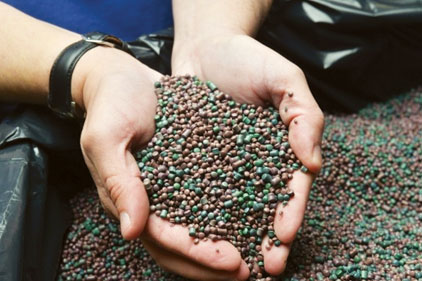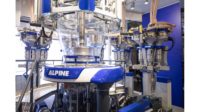
|
| In an effort to advance and accelerate landfill-free initiatives, a flexible packaging and multi-layer film recycling company is offering a solution to help companies see this goal to fruition, called Landfill Free in Three. |
A new approach has been introduced into the flexible packaging and multi-layer film industry. In an effort to advance and accelerate landfill-free initiatives, InterGroup International, Ltd., the flexible packaging and multi-layer film recycler, is offering a solution to help companies see this goal to fruition.
Called Landfill Free in Three, the program sets targeted, attainable goals to bring flexible converters and printers to landfill-free status within three years.
Neil Gloger, CEO of InterGroup International describes the plan as the most effective way to achieve this goal. “Many companies have a sustainability goal or vision. It is good for everyone. Without a plan though, it is only a wish. What InterGroup does is turn this dream into a measurable reality. We bring all stakeholders: brand owners, corporate management, operations, finance, EHS and the guys on the floor together. We help them establish a baseline, their current situation. Then, we implement a plan that helps change behavior and report measurable results.”
The effort, led by InterGroup senior buyer Gus Gatanas, offers companies a range of options to consider. “Some companies we work with are incentivized by brand owners and CPGs who encourage a sustainable structure up and down their logistics chain. Other companies are driven by a perception that their green approach to business will help them win the hearts, and wallets, of consumers.”
Gatanas offers a range of options to companies. “We do not have a boilerplate approach. We employ a consultive approach. We work with our counterparts to identify goals, place each milestone on a timeline, plan and achieve those goals.”
“Some companies look at the cost/benefit and decide that being landfill free is too costly, so we work with them to find the right balance. We may establish a goal of 85, 90, or 95 percent landfill free status. This is about progress, not perfection,” Gatanas states.
Gatanas relates InterGroups’ first success story: “Working with a converter based in the Fox Valley in Northeast Wisconsin, we were able, within 15 months, to bring them from sending three to four roll-off dumpsters per week to the landfill, to only two in all of 2013.” That, Gloger says is not only gratifying, but a huge win for all involved. “The plant could not believe how much of what was going to landfill could be recovered for value, and, frankly, we were surprised too,” Gloger says.
In another instance, InterGroup diverted 2.5 million lbs per month from a Mid-South converter from landfill. “That plant is not quite landfill free. We’ve been working with them for 30 months, and due to the sheer volume, we’ve gone one stream at a time, but are well on track to hit our goal within the next 6 months,” Gloger says.
“We use multiple solutions depending on the needs of the stakeholders: Brand owners have their concerns about material disposition due to end of life considerations such as Basel accords, counterfeiting concerns, and brand equity dilution. Operations is concerned with labor cost and process flow (and disruption). Finance is concerned with cost,” Gloger says. InterGroup addresses each stakeholders concern and works toward a win-win-win solution.
Gatanas says that when InterGroup started talking about landfill avoidance, brand owners got fearful that whatever didn’t go to landfill, would end up in some far-flung corner of the world and be used to package counterfeit…or even worse, contraband goods such as drugs. “We do export some material,” Gatanas says. “But, what makes InterGroup different is that our logistics chain is transparent to our counterparties. We have engaged trusted partners overseas, and have brought counterparties over to see the operation and approve of the logistics change and disposition of the material,” says Gatanas.
For those brand owners who require secure destruction, InterGroup’s company-owned facilities in North America provide certificates of destruction and end-use certification which includes physical audits by brand owners, scrap generators and related third parties, as well as a video record of the destruction.
“It’s important to get buy-in from all. We’re asking people to change their behavior, to do something different, to get out of their comfort zone. The program can be sabotaged if buy-in is not achieved,” says Gloger. This buy-in is supported by on-site training, signage to direct collection to the right containers, and samples of the finished goods that are made out of the recycled product. “People will get on board if they understand the goal and why it is vital,” says Gatanas. “InterGroup invests in education and training so the guy on the floor will take ownership of all material streams flowing through the plant. That is a key to success,” Gatanas says.
Unlike many competitors who take a commodities based “trading” approach, InterGroup works as a partner with the companies it engages. In some cases, there is a net cost. “Market conditions and mix of material have a big impact on value generation,” Gloger says. There are instances when a brand owner demands secure destruction, or collection of material results in a comingled state that cannot be recovered for value. “We have resources to keep this material out of landfill,’ Gloger says, “but there is a cost. This program is most effective when companies have a landfill-free goal,” Gloger says.
InterGroup delivers measurable results. One of the tools they provide is an online dashboard. “The biggest issue for sustainability managers within an organization is data compilation.” Gloger says InterGroup has developed an on-line dashboard which can track waste and recyclables from system wide, to plant wide, to collection point in the plant. “This level of granularity is key to our approach. We want to shine a bright light on this….We believe it will not only help companies in their landfill-free scorecard reporting, but will also cause a higher level of efficiency within the plant.”
Tim Carter, InterGroup’s National Sales manager says that sustainability reporting and life cycle assessments are now a critical part of a company’s culture.
“Most plant managers know that there is more that they can do to increase efficiency and lower scrap and waste rates. But the resources to track this are too expensive at the plant level. InterGroup can help solve this,” Gloger says.
While not endorsing a specific reporting criteria, such as the Walmart Sustainability Scorecard, InterGroup works within a companies set of criteria in designing a landfill-free solution and tracking methodology customized to meet the needs of its Counterparties.
“It’s exciting for me to walk through a big-box retailer,” Carter says, “because I see so many products that contain our reprocessed materials.”
“It’s a great feeling to know that we help our vendors find best-use homes for their byproduct streams, help the earth by not filling it with trash, and we help our end-users by providing them a low-cost, environmentally friendly material stream, Carter says.
“We stopped calling ourselves recyclers because we do so much more to service our counterparties,” Gloger says. “Now, we say ‘We Watch Your Wasteline.’”
InterGroup International, Ltd.
(216) 862-9289; www.intergroupinternational.com/



